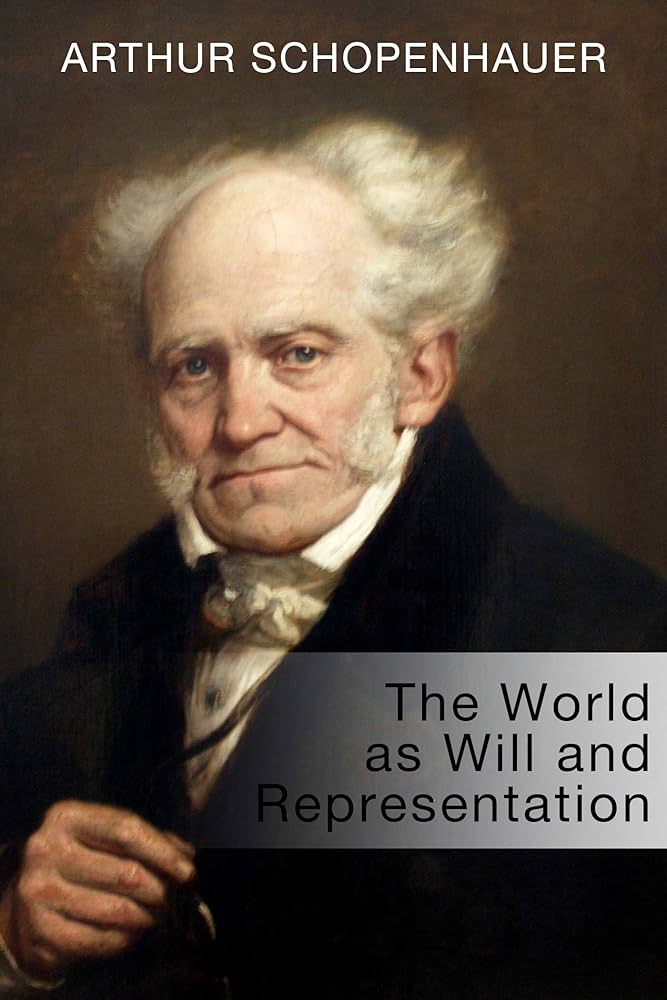Table of Contents
A Dark Mirror of Existence
Arthur Schopenhauer’s The World as Will and Representation (Die Welt als Wille und Vorstellung, 1818) is a towering edifice of German idealism and metaphysical pessimism. Building on Kant’s distinction between phenomena (what we perceive) and noumena (things-in-themselves), Schopenhauer makes a radical claim: the thing-in-itself, the hidden force behind appearances, is Will—a blind, striving, irrational force that underlies all nature, consciousness, and life.
This book is at once a metaphysical treatise, an aesthetic manifesto, and a psychological excavation of human suffering. It deeply influenced Nietzsche, Freud, Wagner, Tolstoy, and even modern existentialism and Buddhist thought in the West.
Core Themes: Will, Suffering, and the Power of Art
The World as Representation
Like Kant, Schopenhauer argues that the world we experience is not reality itself, but a representation (Vorstellung), shaped by the mind’s structures: space, time, and causality. We never access the “thing-in-itself” directly. Our entire experience is mediated by the forms of our consciousness.
This epistemology is radical because it severs reality from perception, anchoring it instead in subjectivity. The world as we know it is essentially a projection.
The World as Will
Unlike Kant, Schopenhauer claims that the hidden reality—what Kant left unknowable—is knowable through introspection. We experience ourselves not merely as representations, but also as will: the felt inner drive, desire, and striving. This Will is not rational or moral; it is a blind impulse, manifesting in everything from gravity to sexual reproduction.
This leads to his most provocative claim: all of nature is an expression of Will, and thus all beings suffer under the same restless striving.
Suffering as Inherent to Existence
If Will is the essence of reality, and Will is endless wanting, then existence itself is steeped in perpetual dissatisfaction. Pleasure is fleeting, desire constant, and fulfillment always just out of reach.
Schopenhauer is often called the philosopher of pessimism, not out of despair, but because he sees suffering as metaphysically necessary. Birth itself is the entry into a cycle of craving and pain.
Art as Salvation
Despite his bleak metaphysics, Schopenhauer offers a pathway out: art. In moments of aesthetic contemplation—whether through music, painting, or literature—we escape the tyranny of the Will. The contemplative subject loses their individuality and becomes a pure, will-less observer.
He elevates music above all other arts, seeing it as a direct expression of the Will itself—abstract yet universal, emotional yet transcendent.
Asceticism and Renunciation
A more permanent escape from suffering lies in asceticism—the conscious denial of desire and the embrace of will-less existence. Influenced by Eastern thought, especially Buddhism and Hinduism, Schopenhauer finds wisdom in detachment, compassion, and negation of the self.
Unlike Nietzsche, who later criticized Schopenhauer’s denial of life, Schopenhauer sees the saint as the only truly enlightened being.
Influence and Legacy
Schopenhauer was largely ignored in his own time, but his ideas exploded in the late 19th century:
- Nietzsche borrowed his insights into Will, only to reverse them.
- Freud found in Schopenhauer’s unconscious Will a precursor to psychoanalysis.
- Wagner and the Romantics absorbed his fusion of metaphysics and music.
- Buddhist thinkers recognized in his writing a parallel to the Four Noble Truths.
He is also one of the earliest Western thinkers to seriously engage Eastern philosophy, integrating it into a coherent, original metaphysical system.
Strengths and Limitations
Strengths:
- Philosophical Courage: Schopenhauer attempts a total system, integrating metaphysics, aesthetics, ethics, and psychology.
- Psychological Depth: His analysis of desire and suffering predates Freud and existentialism.
- Aesthetic Power: Few philosophers write with such literary and emotional force.
Limitations:
- Pessimistic Absolutism: His assertion that life is inherently painful may seem overstated or dogmatic.
- Gender Bias: Schopenhauer’s misogynistic passages are rightly criticized today.
- Lack of Empirical Basis: His metaphysics, while poetic, are speculative and resistant to scientific validation.
Who Should Read It?
- Readers interested in existentialism, Buddhism, or psychoanalysis
- Philosophers intrigued by metaphysical pessimism
- Artists and musicians exploring the philosophy of aesthetics
- Anyone confronting the nature of desire, meaning, and suffering
TL;DR
The World as Will and Representation is a rare philosophical work that dares to confront the foundations of suffering and the nature of being without flinching. It offers not easy answers but hard-won insights—strangely consoling in their honesty. For those brave enough to follow Schopenhauer’s reasoning, the reward is profound clarity about the pain of life and the fragile beauty of transcending it.

Leave a Reply